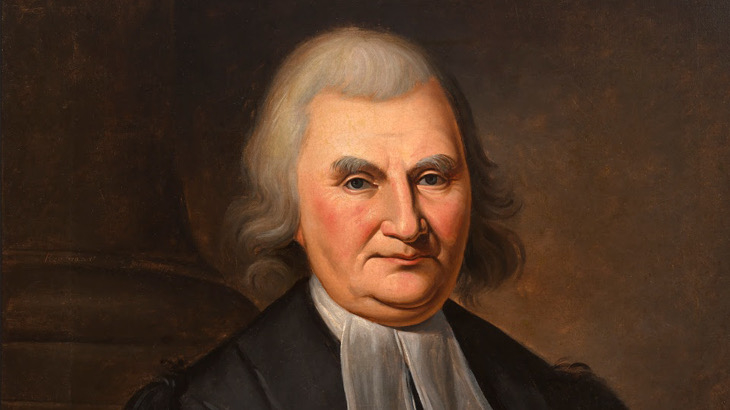John Witherspoon: Presbyterian Minister, President of the College of New Jersey (Princeton), and Signer of the Declaration of Independence
Despite the best efforts of several excellent historians, the contributions of the dissenting Protestant clergy, known as the “Black Robe Regiment” or “Black Regiment,” to the dissemination of revolutionary principles has largely gone unnoticed. The ministers were instrumental in propagating the ideas of John Locke from the pulpit for congregations that were consistent with the revolutionary ideas they read about in pamphlets and newspapers and heard in taverns and legislative halls that formed “the American mind.”
The ministers preached about the ideas of natural rights, self-government by consent, and the right of revolution against tyranny. They urged the young men in their congregations to pick up their muskets and go to war in the defense of their sacred rights from God. The clergy delivered what are called political sermons as they easily wove together their religious and political ideals with their covenant theology that Americans were a new Chosen People.
George III recognized the significance of the clergy and American Revolution and specifically labeled it a “Presbyterian Rebellion.” Scottish Presbyterianism had a strong strain of fierce individualism that blended well with the ideas of the Scottish Enlightenment. The character of Scottish Presbyterianism was particularly strong on the American frontier among a people who defended their liberty against all forms of spiritual and civil tyranny.
Reverend John Witherspoon was born in Scotland in 1723 and educated at the University of Edinburgh, the center of the Scottish Enlightenment. Rev. Witherspoon’s ideas were particularly influenced by thinker, Francis Hutcheson’s System of Moral Philosophy. He emigrated to the American colonies in 1768 to become the President of the College of New Jersey (Princeton) at the urging of Benjamin Rush; First Great Awakening Preacher, Rev. George Whitefield; and the college trustees.
Under Rev. Witherspoon’s brilliant leadership and guidance, Princeton students were inculcated with the ideas of the Scottish Enlightenment and Presbyterianism that supported the revolutionary principles they embraced. Indeed, Witherspoon’s Princeton became a nursery of statesmen as his students included a future president (James Madison), a vice-president (Aaron Burr), a secretary of state, three attorneys general, two foreign ministers, forty-nine U.S. Representatives, twenty-eight U.S. Senators, twelve members of the Continental Congress, five delegates to the Constitutional Convention, and fourteen delegates to state ratifying conventions.
Rev. Witherspoon did not just train revolutionary statesmen for the new republic, he served as an important statesman as well. He served in the New Jersey Provincial Congress, the Continental and Confederation Congress, and the New Jersey ratifying convention. His revolutionary credentials were impeccable and noted by other founders. John Adams thought that, “Dr. Witherspoon enter with great spirit into the American Cause. He seems a Friend as any of the [native colonists]—an animated friend of liberty.” Adams also said that Rev. Witherspoon was a “clear, sensible” minister and, “as high a Son of Liberty, as any Man in America.”
During a congressional day of fasting and prayer in May 1776, Rev. Witherspoon preached a sermon entitled, “Dominion of Providence Over the Passions of Men.” The sermon was a prime example of covenant theology between the American colonists and God. The colonists were bound to have firm beliefs in God and to act with civic virtue which was the basis for good republican government. “They must renounce sin and corruption and virtuously act with justice, prudence, firmness, selflessness, and patience.” Governing themselves and their passions would “make you truly independent in yourselves.” A providential God would bless the American cause of liberty if they followed their part of the covenant, Rev. Witherspoon explained.
In late June 1776, Rev. Witherspoon joined the Continental Congress just as the body was preparing to discuss Richard Henry Lee’s resolution for independence and the draft of the Declaration of Independence. He participated in the debates and said the colonies were “in danger of becoming rotten for want of [independence].” The Congress adopted Lee’s resolution and Jefferson’s Declaration.
In 1782, Rev. Witherspoon was honored to write the congressional proclamation for a day of thanksgiving and continued to proclaim covenant theology in the American republic. He urged his fellow Americans to the “practice of true and undefiled religion, which is the great foundation of public prosperity and national happiness.” He said in a sermon associated with the day of thanksgiving: “Civil liberty cannot long be preserved without virtue…a republic once equally poised, must either preserve its virtue or lose its liberty.”
Perhaps a British officer summed up Witherspoon’s significance as a member of the Black Regiment and influence as president of Princeton had in advancing revolutionary principles and independence. “Dr. Witherspoon…the political firebrand who perhaps had not a less share in the Revolution as Washington himself. He poisons the minds of his young students and through them the Continent.”
 Tony Williams is a Senior Fellow at the Bill of Rights Institute and is the author of six books including Washington and Hamilton: The Alliance that Forged America with Stephen Knott. Williams is currently writing a book on the Declaration of Independence.
Tony Williams is a Senior Fellow at the Bill of Rights Institute and is the author of six books including Washington and Hamilton: The Alliance that Forged America with Stephen Knott. Williams is currently writing a book on the Declaration of Independence.
Podcast by Maureen Quinn.
Click Here To Sign up for the Daily Essay From Our 2021 90-Day Study: Our Lives, Our Fortunes & Our Sacred Honor
Click Here To View the Schedule of Topics From Our 2021 90-Day Study: Our Lives, Our Fortunes & Our Sacred Honor



Join the discussion! Post your comments below.
Your feedback and insights are welcome.Feel free to contribute!